The Year of The Longhorn
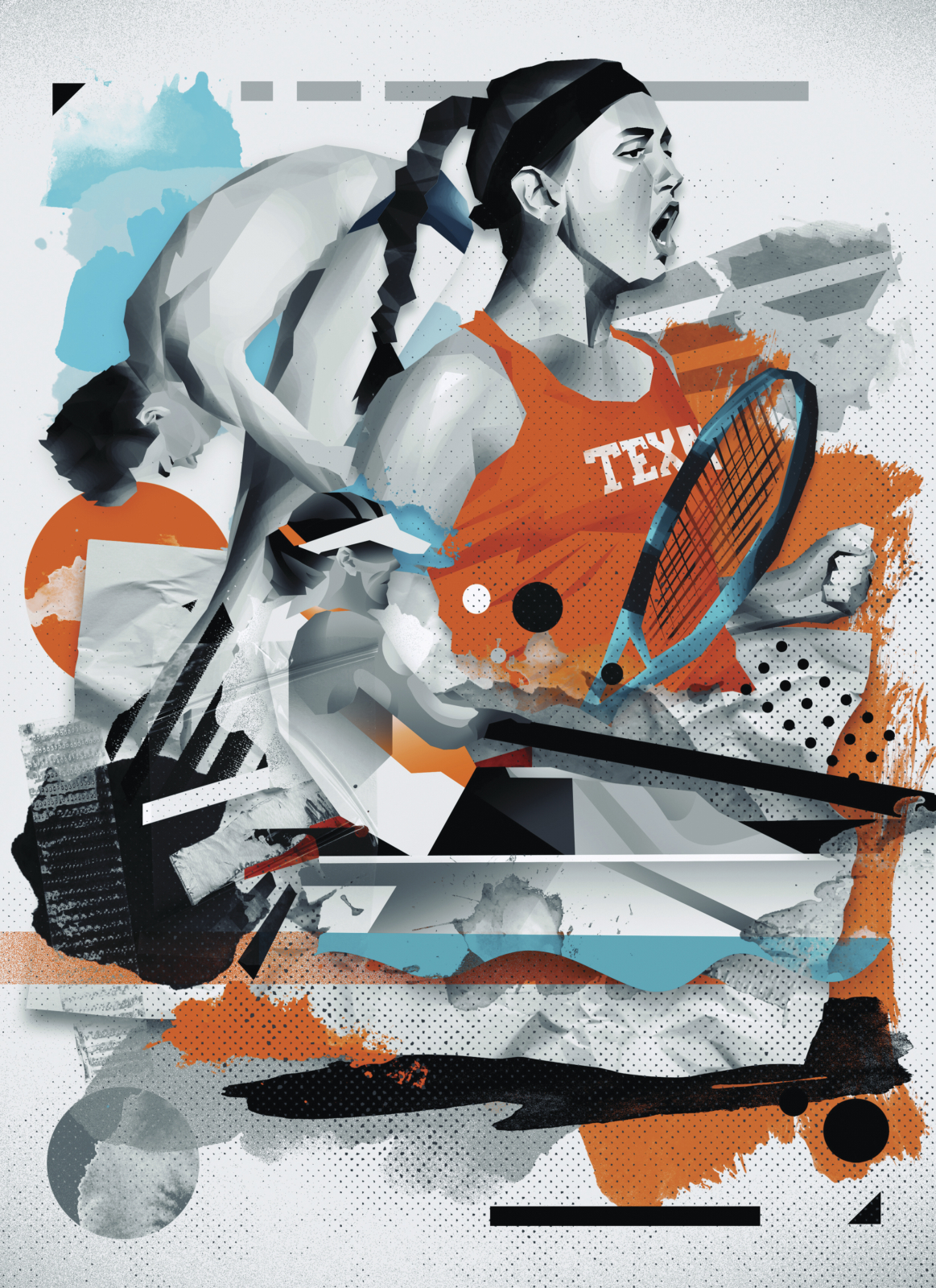
With three national championships, 13 top-10 teams, and 13 Big 12 championships, Texas is an football volleyball golf swimming and diving every sport school.
If you’re a Texas sports fan who spends too much time on Twitter, you’re familiar with the meme. “Texas is a volleyball school.” “Texas is a golf school.” “Texas is a swimming and diving school.” They are tweets of pride and braggadocio, but also more than just a bit of irony. Because, of course, The University of Texas is supposed to be a football school above all else—but it’s the “all else” teams and athletes that keep winning championships.
UT Vice President and Athletics Director Chris Del Conte—no stranger to Twitter himself—chooses to take such sentiments entirely at face value. “They’re just acknowledging that we’re good across the board, and not a one-trick pony,” he says. “When you think about The University of Texas, our program has been about greatness across all sports.”
Now more than ever, that is not a boast. A frequent and longtime NCAA powerhouse in the Olympic and “non-revenue” sports—essentially everything besides football and men’s basketball—the Longhorns took things to another level during 2020-21. A year that started with the cancellation of all spring sports, followed by disrupted schedules, virtual team meetings, unfamiliar practices, and nothing you’d call normal life, became a triumph on the fields and courts and pools and tracks and lakes. With so little happening on campus, the electric bill at UT Facilities Services might have been a little lower. But not at the Tower, which just kept lighting up burnt orange.
All told, the Longhorns took home three national championships: men’s swimming and diving, women’s tennis, and rowing, while also notching 13 Big 12 championships (tying UT’s own league record). Thirteen teams were also in the top 10 nationally, with seven—the three national champions, volleyball, women’s swimming and diving, men’s tennis, and baseball—claiming top three rankings. And while baseball fell one game short of the College Baseball World Series finals, their memorable run, along with softball’s Super Regional appearance, put the crowning touch on UT’s first-ever Learfield IMG College Directors’ Cup, an all-sports prize awarded annually to “the nation’s best overall athletics program” since 1993.
It was one of the greatest, if not the greatest, years of sport in University of Texas history—in spite of everything, and in fact, all the more impressive given everything. “This has been really a hard year, and we still have hard questions to address and work through,” Del Conte says, acknowledging not just COVID-19 and the Texas winter storm, but also a national reckoning around racial injustice, and the tension of the 2020 presidential election. “The one thing we wanted to do here is give our kids some sense of normalcy. They needed something they could count on and rely on, and sport was it.”
For women’s tennis coach Howard Joffe, the processes and protocols were handled so well that “it was very much a ‘normal’ competitive year,” he says. But according to rowing head coach Dave O’Neill, the parts that weren’t also sparked team chemistry.
“All the sacrifices, changes, and protocols made us really appreciate what we had with our team,” he says. “We looked at being able to be together and have practice as a gift, so there was a real joy every morning. We truly made the most of each opportunity to be together, and that made us that much faster at the championship.”
“The great satisfaction today is just to say, ‘Wow, they did it,’” Del Conte says. “They persevered through the most difficult times. They embraced the opportunity, and they were so successful.”
Here’s how it all went down.
The Greatest Coach Ever
Tweets aside, men’s swimming and diving will never be more popular than football. Nor, for that matter, basketball and baseball. But when it comes to listing the greatest championship coaches in UT history across all sports, there’s really no debate: Darrell K Royal, Mack Brown, Jody Conradt, Cliff Gustafson, and Augie Garrido all take a back seat to Eddie Reese.
When the Horns prevailed at the NCAA men’s swimming and diving championship meet in Greensboro, North Carolina, on March 27, 2021, the UT Tower was lit up special: the standard “#1” on the north and south sides, but also a “15” on the east and west, to mark how many titles Reese had won. That number includes five of the last six (2015, 2016, 2017, 2018, and 2021, with no meet in 2020), and also spans five decades: three in the ’80s, three in the ’90s, and three in the ’00s, plus five more since 2010, and now the current title. It’s also the seventh-most of any coach in NCAA history, across all sports. Diving coach Matt Scoggin, BSW ’97, is no less accomplished. The 1992 Olympian has now been at UT with Reese since 1994.
Stacked with more than two dozen All-Americans or All-America honorable mentions, the 2021 Horns started strong and finished steady. Triumphs in the 800-yard freestyle relay (Drew Kibler, Austin Katz, Carson Foster, and Jake Sannem), the 1-meter diving event (Jordan Windle, plus Noah Duperre in second place) and the 400-yard medley relay (Chris Staka, Caspar Corbeau, Alvin Jiang, Daniel Krueger) allowed UT to stay in front of Cal-Berkeley, the 2019 champion, merely by placing in most other events. All 20 members of the squad scored, with top eight finishes by at least one swimmer or diver in every individual event. When the 595-568 score became final, Reese, who turned 80 in July, jumped into the pool, joining his team in celebration without taking off his street clothes.
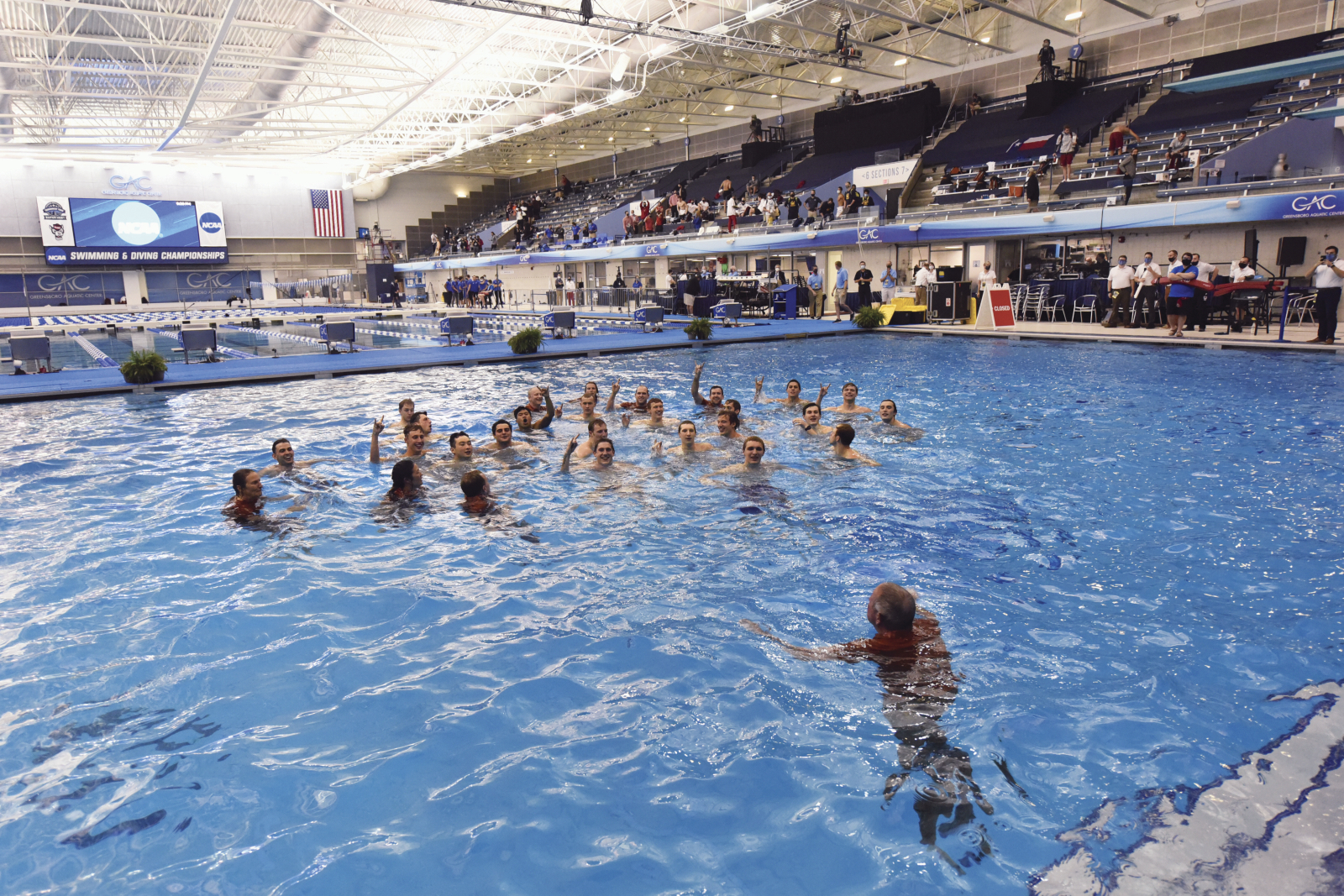
Those clothes were barely dry when the legendary coach announced his retirement just two days later. But on July 1, UT got another win when Reese decided to come back, a decision that purportedly played out in real-time via tweets between Del Conte and President Jay Hartzell, with the two men “deciding” that they simply wouldn’t sign Reese’s retirement papers.
“There’s more that I want to do for this current team,” Reese later said in a statement (also via Twitter). “We have a great group of guys in our program. They have a great future in the sport, and I want to help them be as good as they can be.”
“This team inspired him so much,” Del Conte says. “He took some time away, came back, and said, ‘I have more to give.’ I think he’s 20 years younger being around these young people.”
Fabulous Freshmen
Since leaving Texas A&M for Austin in 2016, South African-born women’s tennis head coach Howard Joffe has improved the program almost every year, making the NCAA tournament each season while taking the Horns from a No. 20 ranking in 2016 to No. 6 in 2018, No. 9 in 2019, and No. 4 in the abbreviated 2020. Now he’s got a national championship: UT’s first since 1995.
The No. 2-ranked 31-1 Longhorns stormed through both the Big 12 tournament and the first five rounds of the NCAA bracket, with match scores of 4-0, 4-0, 4-0, 4-1, and 4-0 in the latter. In the final against No. 5-ranked Pepperdine, Texas went up 1-0 with wins in two of the three doubles sets, with Peyton Stearns and Charlotte Chavatipon winning a 7-6 (7-5) thriller to clinch. Then the Waves—Pepperdine is a surfing school–took three of the five singles matches, leaving UT’s Swiss freshman Lulu Sun to try and break the 3-3 tie against Taisiya Pachkaleva.
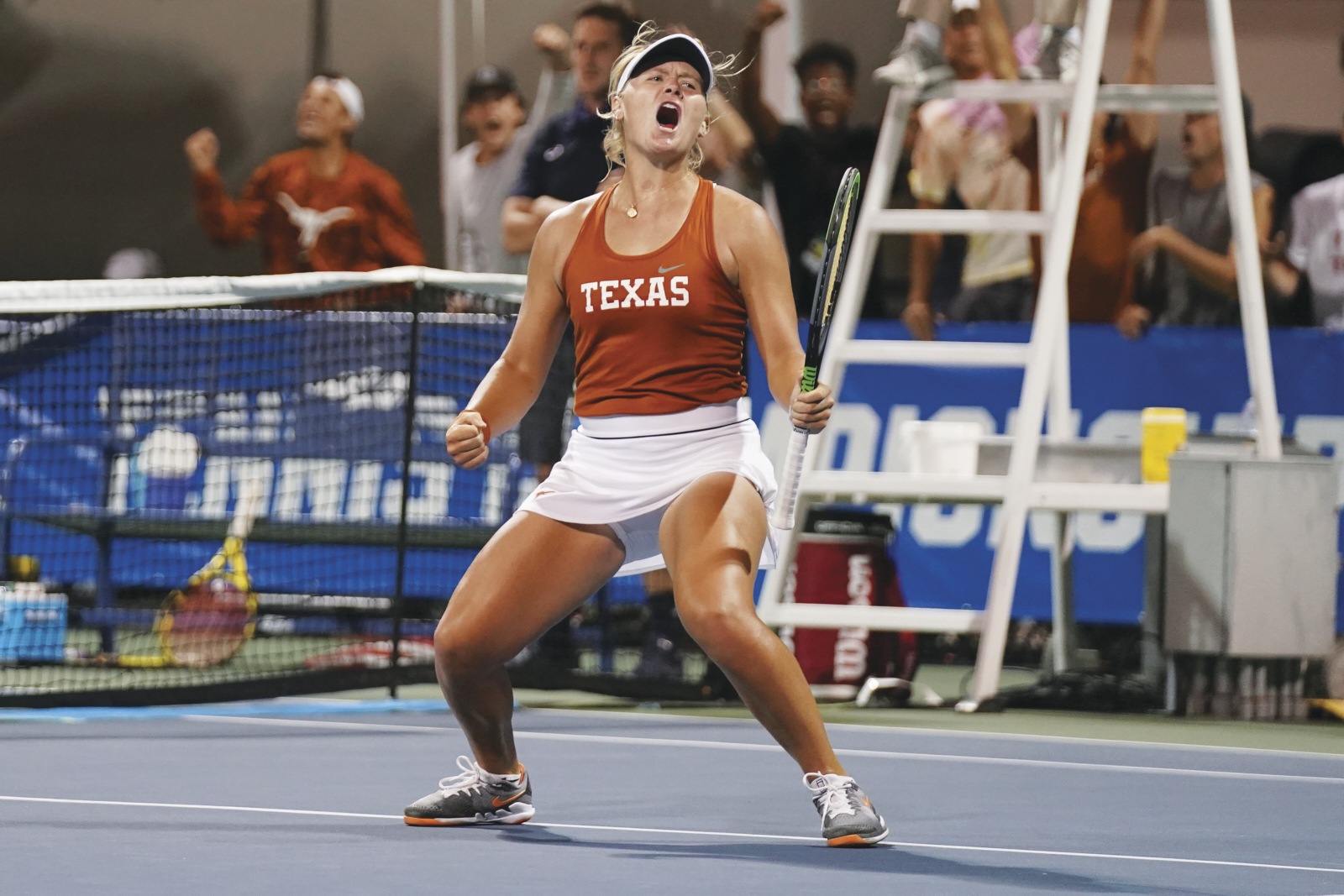
It was a nerve-wracker, with the hard-hitting Sun winning the first set 6-4, then dropping set two in a tiebreaker, 6-7 (3-7). At 3-3 in the third set, the two players swapped both service holds and service breaks, making it 5-5, but then Sun did it a second time, avoiding another tiebreaker with a 7-5 win. The clinching rally, which ended with Pachkaleva returning a baseline shot into the net, will always stick with Joffe.
“To see the unfiltered and raw joy and jubilation of our players, as well as the love and mutual admiration for each other, is a moment and feeling that is unmatched,” he says. Throughout the night, the women were also cheered on by the men’s team, which had bowed out in the semifinals.
What made the season and the championship especially notable is that five of the six singles players in the title match were freshmen, part of Joffe’s top-ranked 2020 recruiting class.
“Achieving a modicum of growth with such a young group is perhaps equally as noteworthy as actually winning the title,” he says.
And of course, that also means there’s more to come.
“Let’s Turn This Into a Rowing School”
Texas rowing has only been around since 1997, which is when 53 Division I schools moved the women’s sport from club to varsity. And, like all the spring teams, the rowing Longhorns had their 2020 season canceled. So having waited decades to become an NCAA sport, and a whole year to get back in action, what was two more hours?
UT was in third place on the last day of the 2021 NCAA rowing championship in Sarasota, Florida. Win the Varsity Eight grand final, and Texas had a chance to get past Washington and Stanford, though only if the Huskies and the Cardinal didn’t earn too many points as runners-up. Would lightning strike? Why yes—literally, suspending the event until the skies had cleared.
“The start of the last race was delayed nearly two hours,” says rowing head coach Dave O’Neill. “This added to the drama in many ways, but it allowed the crews who finished racing to send off the first eight. The emotion and cheer was electric. At that point I knew this team was something special, and felt something amazing was going to happen. And it did.”
UT’s First Eight: Rachel Rane (coxswain), Kaitlin Knifton (stroke), Francesca Raggi, Alexandra Watson, Aspa Christodoulidis, Daisy Mazzio-Manson, Anna Jensen, Susanna Temming, and Lisa Gutfleisch (bow), was in fourth place at the 500-meter mark, and third behind Stanford and Washington at the midpoint. At 1500, the Horns trailed only the Cardinal, and made their move, finishing the race with a final time of 6:17.387, followed by Stanford at 6:18.891. UT also finished third in the Second Varsity and Varsity Four finals, adding crucial points to what wound up as a three-way tie. Finishing first in the Varsity Eight race gave UT the tiebreaker, and the program’s first national championship.
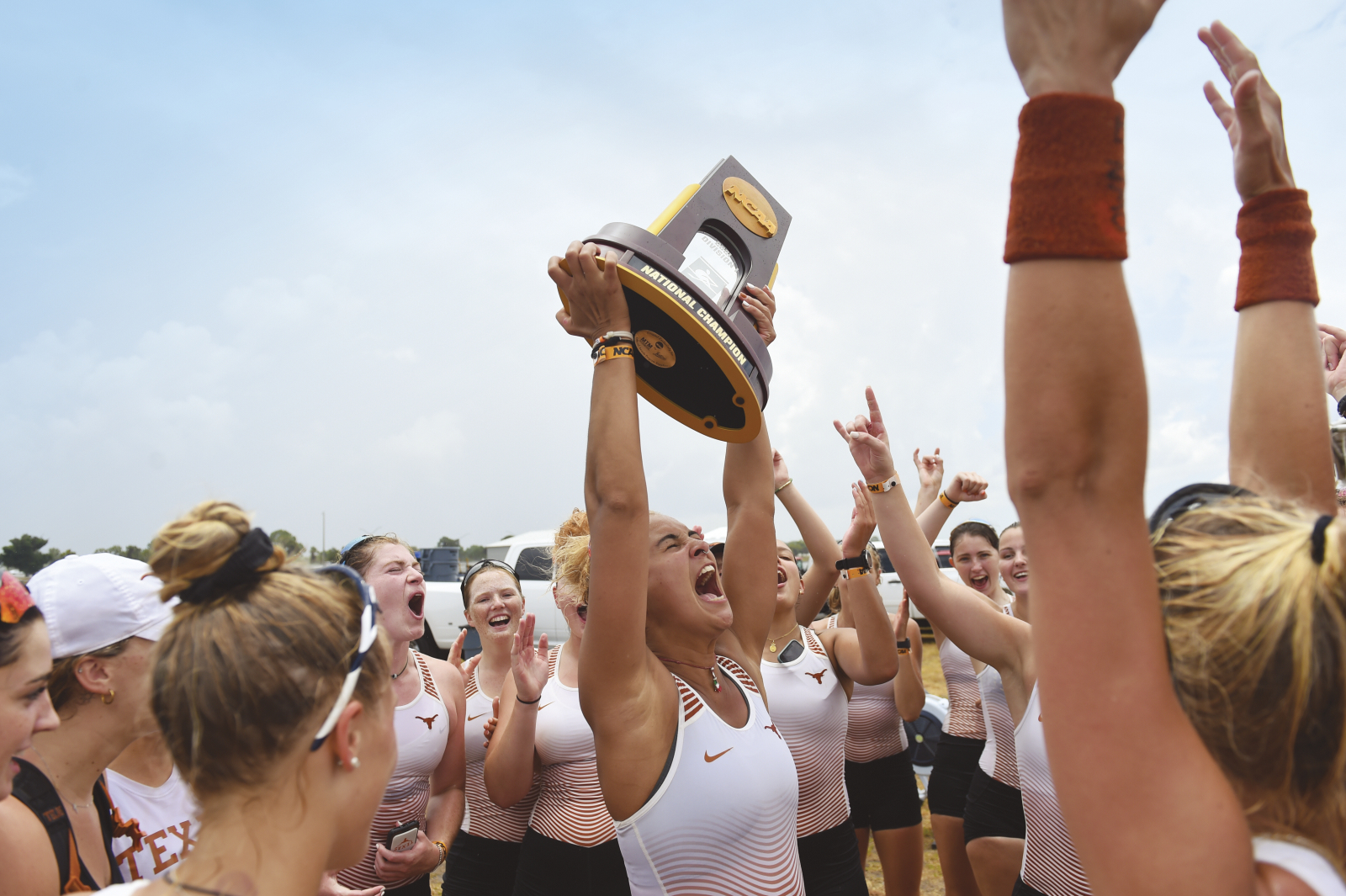
During an interview with Roger Wallace of Austin’s KXAN TV, O’Neill even went there: “From day one, when we came in here, we said like, ‘yeah, Texas: It’s a really good football school, and they’ve got a really great tradition in swimming, and a number of other sports. Let’s turn this into a rowing school!’”
Done.
The Best Athletics Program in the Country
They can’t all win a championship each year. The real measure of success is when your teams repeatedly put themselves in a position to compete for one. “The goal of The University of Texas is to be in the top 10 in the country [in every sport],” Del Conte says.
This year, 13 of UT’s 20 men’s and women’s teams accomplished that, with the three national champions and four top three finishers (volleyball, baseball, mens’ tennis, and women’s swimming and diving) joined by women’s golf and women’s basketball (fifth), men’s outdoor track and field (sixth), women’s outdoor track and field (seventh), women’s indoor track and field (eighth), and softball (ninth).
For volleyball head coach Jerritt Elliott, whose squad lost to Kentucky in the NCAA tournament final, runner-up was still a huge accomplishment. “We went to eight of nine Final Fours and then we hadn’t made it the last three years,” says Elliott, who won the national championship in 2012. “It’s pretty easy as a coach to start questioning whether you’re going to ever get back again.”
As the NCAA’s sole first semester indoor sport, volleyball was also most impacted by the virus, with its season split in two: 14 games in the fall, when the NCAA championship would have normally been held, then 10 more plus the post-season in spring.
“It’s been a commitment from them,” Elliott says. “As soon as the fall was over we gave the players so much time off, because we needed them fresh emotionally and physically. But then we had to build them slowly back up, and we only had eight hours a week, so it was challenging. This group has been special. I told them this was one of the most enjoyable years we’ve had.”
It was also hard to quibble with the season baseball had. Even more than football, this is a program that expects national championships. The Horns have six, as well as six times as the runner-up, and 37 total trips to the College World Series (an NCAA record). Fifth-year head coach David Pierce’s team had a flair for the dramatic, starting the season with a three-game losing streak but ultimately finishing with a 40-13 record. Despite losing in the final of the Big 12 tournament to Oklahoma State, the Horns went into the NCAA bracket as the second overall seed, made it to Omaha, and then struck out 21 times against Mississippi State pitchers Will Bednar and Landon Sims in a 2-1 opening loss. Three wins followed, including a lightning-delayed elimination game against Virginia that didn’t end until 1 a.m., and a rematch against MSU in which the Horns blew a 5-2 lead, then won it 8-5 on Ivan Melendez’s three-run homer in the ninth. That left the Horns and Bulldogs playing one more game to get into the series final, and while UT’s hitters handled Bednar better than they had the first time, MSU won it in the bottom of the 9th, 4-3 (and then went on to win the championship).
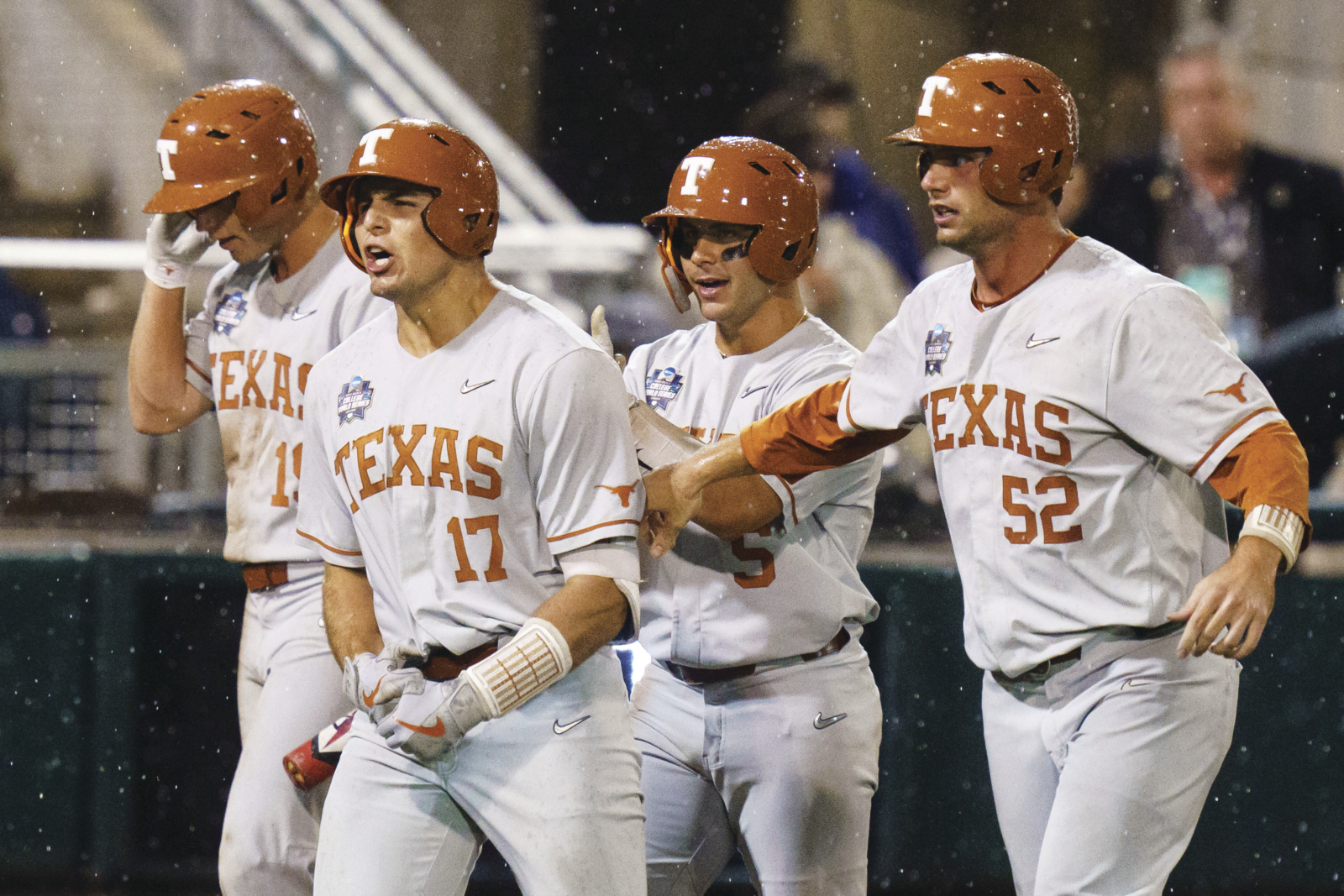
“There’s just so many words to describe this group, and they are all positive,” Pierce says. “Grit, the toughness, the never-give-up mentality, the energy, and just the talent. They did a great job of dealing with COVID. Did a great job of staying in the classroom taking care of business. It’s just a team that has really set the standard of what we expect at The University of Texas.”
All of UT’s teams inspired each other, whether from a distance on the Longhorn Network, or while crossing paths inside “The TANC” (the Texas Athletics Nutrition Center). “When everyone’s doing really well across the board, everyone just feeds upon that success,” Del Conte says. “You’re in the lunchroom and you go, ‘Oh my God, that person’s going to the Olympics. That person is the NCAA champion. That’s the first four-time All-American.’ One team wins, and another team thinks, Hey, we can do that too.”
Even the new football coach has noticed. “I’ve got to say, watching all of the success of our sports programs across the board this spring has been something else,” Steve Sarkisian said at Houston’s Touchdown Club in May. “It’s why you come to Texas. I enjoyed taking it all in, watching all of our teams and athletes compete, and it was a blast cheering them on. Our team sees that, they feel it, and that success motivates all of us. It’s a winning culture. Iron sharpens iron.”
And, in fact, collectively, the entire university took home a championship: The Learfield IMG College Directors’ Cup, which was founded by college athletic directors (the National Association of Collegiate Directors of Athletics, specifically) in 1993. While it’s not something you drink champagne out of—let alone the stuff of giant rallies or parades—it is a huge deal within the world of college sports, and an even huger deal because UT was the first team besides Stanford to win it in 27 years (North Carolina is the only other school to do so, in the first year of the Cup’s existence). UT had previously finished as high as second (three times) third (once), and fourth (in 2018-19), with 21 top-10 appearances. The Cup rankings are based on the performance of four “mandatory” teams—women’s volleyball and basketball and men’s basketball and baseball—plus each program’s 15 best teams. But since Stanford has 36 Division I teams to UT’s 20, that means 15 of UT’s 16 teams have no margin for error.
The pandemic may have helped the Horns a little bit, as California and the Pac-12 dealt with COVID-19 more conservatively than Texas and the Big 12 chose to, meaning UT athletes got more practice time and normalcy. “If you’re into winning, the Texas way was the winning way,” wrote Sports Illustrated’s Pat Forde.
“The idea of knocking off Stanford is something that we have been shooting for for a long, long time,” Del Conte says. “And now, the kids have confidence. They know the roadmap. ‘Wow, we got it. We can actually dethrone ’em. No problem!’ And I think our student-athletes and our coaches are excited about that.”
May as well go ahead and tweet it: Texas is an every sport, Directors’ Cup school.
Credits (from top): Nicholas Chuan, Courtesy of NCAA, Caten Hyde, Mark Kuhlmann





